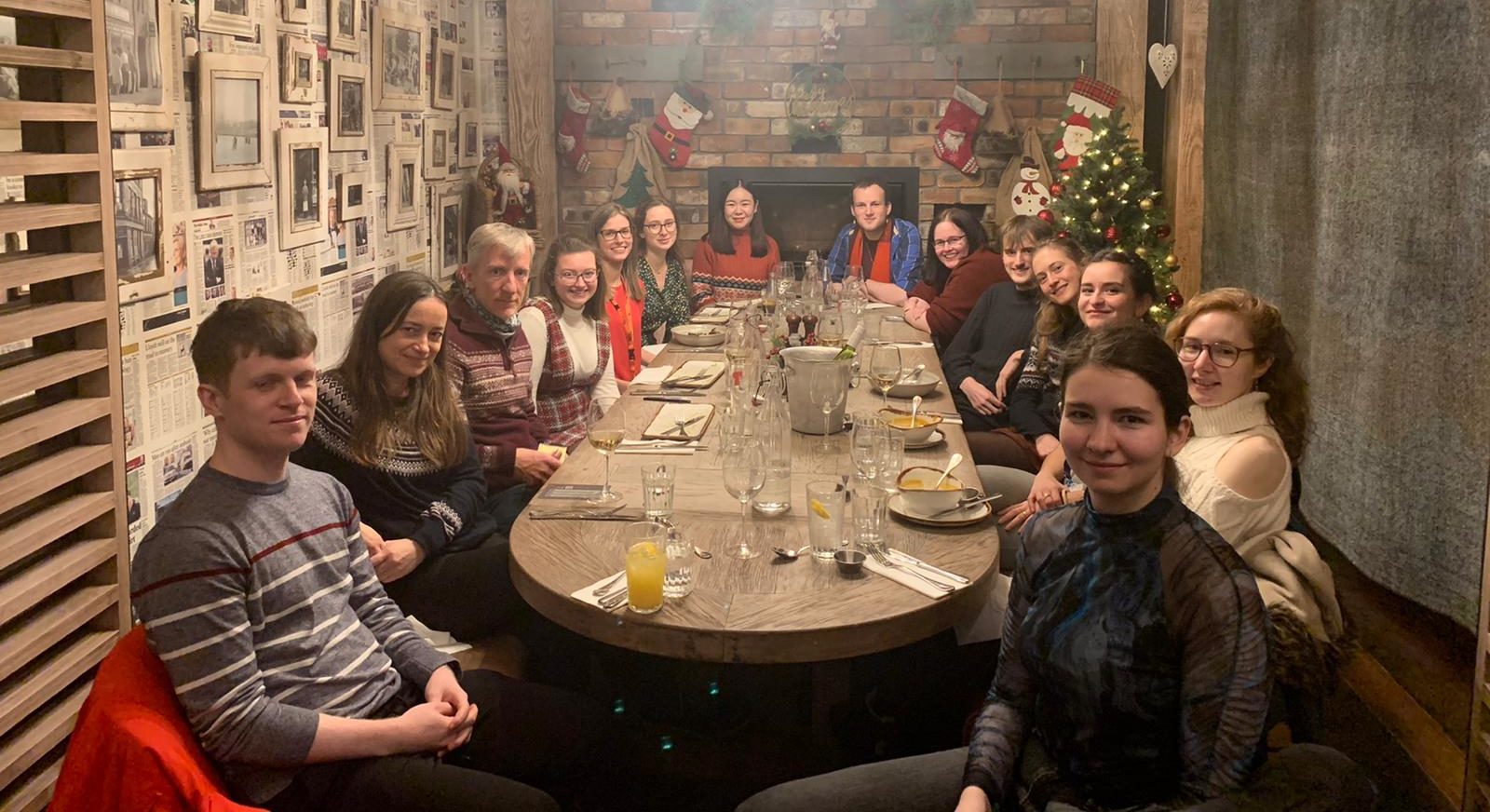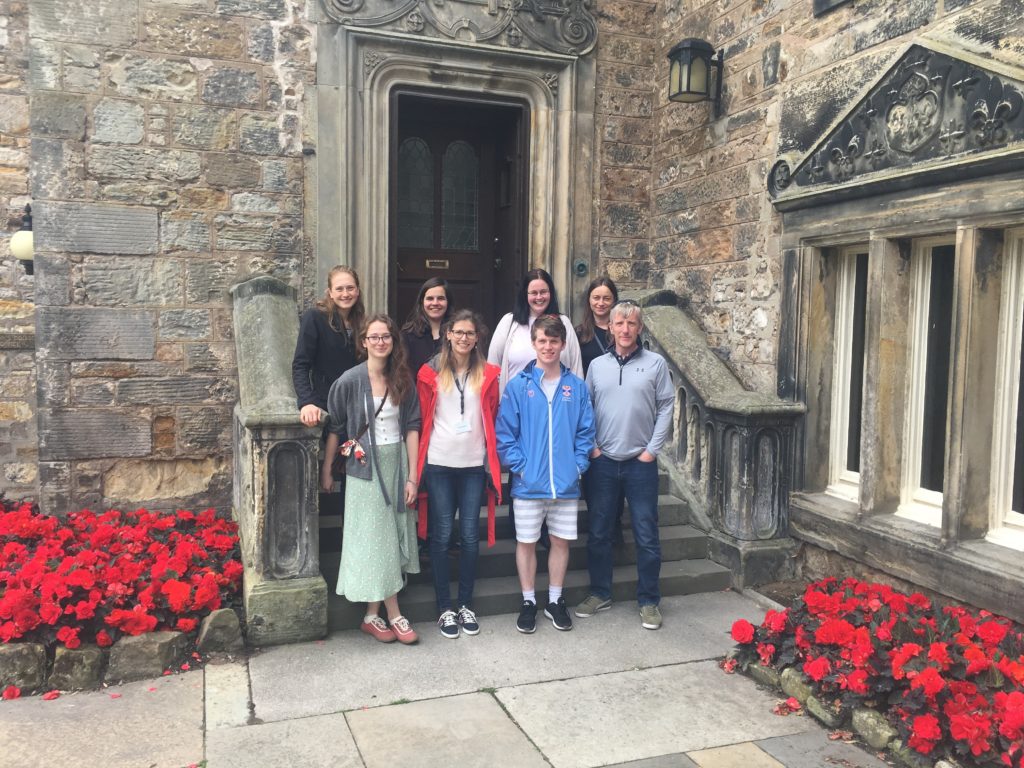The Gloster laboratory
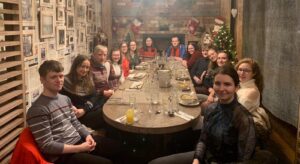
Group Highlights
Tracey Gloster works in the Biomedical Sciences Research Complex at the University of St Andrews. Tracey and her group are interested in understanding eukaryotic carbohydrate processing enzymes from a structural, mechanistic and functional viewpoint using a combination of techniques including molecular biology, protein expression, X-ray crystallography, enzyme kinetics, inhibitor design/development and cell biology.
Our lab website: https://gloster.wp.st-andrews.ac.uk/
Research
Understanding eukaryotic carbohydrate processing enzymes The Gloster group is interested in understanding eukaryotic carbohydrate processing enzymes from a structural, mechanistic and functional view.
Glycans are ubiquitous biomolecules involved in many diverse cellular processes, including protein folding and localization, cell signalling, organism development and energy storage. They are diverse molecules with huge potential for variation in structure, and can be conjugated to protein or lipids in different ways (see Figure 1). The large chemical diversity displayed by carbohydrates is not defined by a template, but regulated solely by the specificity and localization of the enzymes responsible for their synthesis and degradation.

One of the big challenges in the glycan field is finding the link between the carbohydrate composition in cells, the enzymes that synthesize and degrade it, and the phenotype observed when these enzymes fail. Gaining a basic understanding of enzymes at the molecular level provides a platform on which to design and develop tools in order to probe cellular function. Such probes may also have therapeutic benefit in the longer term.
We use a number of techniques including molecular biology, protein production, X-ray crystallography, enzyme kinetics, and cell culture in order to gain understanding of carbohydrate processing enzymes of interest.
One particular focus is on the enzymes responsible for the degradation of heparan sulphate, a glycosaminoglycan found in the extracellular matrix. The enzymes responsible for completely degrading heparan sulphate are implicated in diseases including lysosomal storage diseases (mucopolysaccharidoses), cancer and neurodegenerative diseases. We aim to investigate these enzymes structurally and mechanistically, and with the development of tools, such as enzyme inhibitors, we are aiming to probe the biological functions of these enzymes.
Group Members
Lab Members
Principal Investigator
Tracey Gloster
 Tracey graduated with a BSc (Hons) degree in Biochemistry at the University of Warwick, followed by a PhD at the University of York under the supervision of Prof. Gideon Davies. After a short post-doc in the same lab, Tracey was awarded a Sir Henry Wellcome postdoctoral fellowship by the Wellcome Trust where she spent the majority of the time working at Simon Fraser University, Canada under the mentorship of Prof. David Vocadlo. In January 2012, Tracey moved to the University of St Andrews with a Wellcome Trust Research Career Development Fellowship where she started an independent research group.
Tracey graduated with a BSc (Hons) degree in Biochemistry at the University of Warwick, followed by a PhD at the University of York under the supervision of Prof. Gideon Davies. After a short post-doc in the same lab, Tracey was awarded a Sir Henry Wellcome postdoctoral fellowship by the Wellcome Trust where she spent the majority of the time working at Simon Fraser University, Canada under the mentorship of Prof. David Vocadlo. In January 2012, Tracey moved to the University of St Andrews with a Wellcome Trust Research Career Development Fellowship where she started an independent research group.
Postdoctoral Fellow
Stephen McMahon
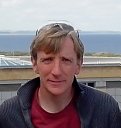 Hailing from the Glasgow I truly am the foreigner living over on the far east coast in St. Andrews. I graduated BSc (Hons) Chemistry with Medicinal Chemistry from Glasgow University last century and went on to do a PhD with Dr. Jim Naismith at the University of St Andrews. Three and a half years later I (temporarily) escaped St Andrews and headed back west to take up a post-doctoral position in Prof. Partho Ghosh’s lab at the University of California, San Diego. The California sun was too much to bear and so it was I returned to St. Andrews in 2005 to take up residence for 13 years in Prof. Jim Naismith’s lab. In 2018 I happily migrated up the office to work in the Gloster lab where I currently reside solving lots of protein structures and deciphering carbohydrate processing enzyme problems.
Hailing from the Glasgow I truly am the foreigner living over on the far east coast in St. Andrews. I graduated BSc (Hons) Chemistry with Medicinal Chemistry from Glasgow University last century and went on to do a PhD with Dr. Jim Naismith at the University of St Andrews. Three and a half years later I (temporarily) escaped St Andrews and headed back west to take up a post-doctoral position in Prof. Partho Ghosh’s lab at the University of California, San Diego. The California sun was too much to bear and so it was I returned to St. Andrews in 2005 to take up residence for 13 years in Prof. Jim Naismith’s lab. In 2018 I happily migrated up the office to work in the Gloster lab where I currently reside solving lots of protein structures and deciphering carbohydrate processing enzyme problems.
Research Technician
Verena Oehler
 Originally from Germany, Verena studied at the University of Glasgow where she obtained a BSc (Hons) in Biochemistry and a PhD in Cancer Research. After post-doctoral training at the Centre for Virus Research in Glasgow, she has taken on a position as Research Technician for the group. Verena is working on human carbohydrate-processing enzymes.
Originally from Germany, Verena studied at the University of Glasgow where she obtained a BSc (Hons) in Biochemistry and a PhD in Cancer Research. After post-doctoral training at the Centre for Virus Research in Glasgow, she has taken on a position as Research Technician for the group. Verena is working on human carbohydrate-processing enzymes.
PhD Students
Agnieszka Bogucka
 Originally from Poland and grown up on a remote Irish island, Agnieszka graduated with a BSc (Hons) degree in Biopharmaceutical Chemistry at the National University of Ireland Galway. She spent six months working as a pre-doctoral research fellow at the Groopman Lab at the Department of Experimental Medicine at Beth Israel Deaconess Medical Center, Harvard Medical School under the guidance of Dr. Gabriel Birrane. She has also completed a summer internship studying calixarene driven protein self-assembly at Crowley Lab, National University of Ireland Galway. Agnieszka joined the University of St Andrews in September 2017 and is working on sulfatases involved in the heparan sulfate degradation.
Originally from Poland and grown up on a remote Irish island, Agnieszka graduated with a BSc (Hons) degree in Biopharmaceutical Chemistry at the National University of Ireland Galway. She spent six months working as a pre-doctoral research fellow at the Groopman Lab at the Department of Experimental Medicine at Beth Israel Deaconess Medical Center, Harvard Medical School under the guidance of Dr. Gabriel Birrane. She has also completed a summer internship studying calixarene driven protein self-assembly at Crowley Lab, National University of Ireland Galway. Agnieszka joined the University of St Andrews in September 2017 and is working on sulfatases involved in the heparan sulfate degradation.
Catriona Haberland (co-supervisor Gordon Florence)
I am a CRITICAT PhD student from Germany with a BSc degree in Biomolecular Science from the University of St Andrews (2018). During my PhD, jointly supervised by Dr Tracey Gloster and Dr Gordon Florence, I will be researching the sulfatases Sulf1 and Sulf2 at a molecular level, among other using enzyme kinetics, X-ray crystallography and synthetic chemistry. With my research I hope to expand the fundamental understanding of these enzymes and to explore their biomedical potential.
Flora Foltanyi (co-supervisor Gordon Florence)
Flora is originally from Hungary and completed her MSci in Natural Sciences in Biology and Chemistry at the University of Durham in summer 2018. She moved to St Andrews in September 2018 and she is currently working on the extraction and enzymatic modification of hemicellulose from lignocellulosic biomass under the co-supervision of Dr Tracey Gloster and Prof Nicholas Westwood.
Emma Hobbs (co-supervisors Leighton Pritchard/Sean Chapman)
 Originally from England, Emma obtained a BSc (Hons) in Biochemistry from the University of Surrey which included a 12 month placement at GlaxoSmithKline’s Medical Research Centre (Hertfordshire, England) within the Protein and Cellular Sciences department to design and generate candidate protein targets. Afterwards in September 2019 Emma moved to St Andrews as a PhD student under joint supervision of Dr Tracey Gloster, and Dr Leighton Pritchard and Dr Sean Chapman of the James Hutton Institute. Emma’s research involves using bioinformatics to data mine fungal genomes to identify potential cell-wall carbohydrate degrading enzymes, using X-ray crystallography and enzymatic assays to determine their structure and function, and use of synthetic biology approaches to optimise their carbohydrate-active properties for potential use in biofuel production.
Originally from England, Emma obtained a BSc (Hons) in Biochemistry from the University of Surrey which included a 12 month placement at GlaxoSmithKline’s Medical Research Centre (Hertfordshire, England) within the Protein and Cellular Sciences department to design and generate candidate protein targets. Afterwards in September 2019 Emma moved to St Andrews as a PhD student under joint supervision of Dr Tracey Gloster, and Dr Leighton Pritchard and Dr Sean Chapman of the James Hutton Institute. Emma’s research involves using bioinformatics to data mine fungal genomes to identify potential cell-wall carbohydrate degrading enzymes, using X-ray crystallography and enzymatic assays to determine their structure and function, and use of synthetic biology approaches to optimise their carbohydrate-active properties for potential use in biofuel production.
Di Zhu (Judy)
Originally from China, Di graduated with a Bachelor degree in Pharmaceutics, then obtained a Master degree in Pharmacy (major in Molecular and Cell biology) at Tianjin University in China. Now, she is starting a PhD with the supervision of Dr Tracey Gloster under CSC scholarship funding. The PhD project aims to use enzymes to synthesize nucleotide sugars.
Shannon Richardson
Shannon is from the North of England and completed her MSci in Natural Sciences in Chemistry and  Biology at Durham University. After completing her degree, she took a year out to work in a Covid-19 testing lab before moving to St. Andrews in September 2021. She is an EASTBIO DTP student focusing on human carbohydrate-processing enzymes and their role in disease.
Biology at Durham University. After completing her degree, she took a year out to work in a Covid-19 testing lab before moving to St. Andrews in September 2021. She is an EASTBIO DTP student focusing on human carbohydrate-processing enzymes and their role in disease.
Research Assistant
Stuart McQuarrie
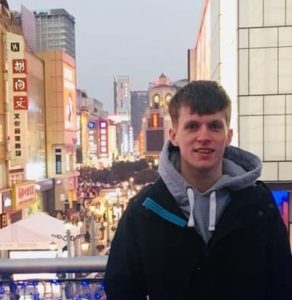 After my Molecular Biology degree in St Andrews I did a year of research with Tracey for my Masters. My project involved using crystallography to solve the structures of glycoside hydrolases at different stages of catalysis with novel inhibitors. Since completing my Masters I have returned as a Research Assistant for 6 months to work on CRISPR-related crystallography projects in collaboration with Malcolm White. I’m originally from Glasgow, I’m a wannabe gymnast and I love Chinese food!
After my Molecular Biology degree in St Andrews I did a year of research with Tracey for my Masters. My project involved using crystallography to solve the structures of glycoside hydrolases at different stages of catalysis with novel inhibitors. Since completing my Masters I have returned as a Research Assistant for 6 months to work on CRISPR-related crystallography projects in collaboration with Malcolm White. I’m originally from Glasgow, I’m a wannabe gymnast and I love Chinese food!
Publications
Articles
CRISPR antiphage defence mediated by the cyclic nucleotide-binding membrane protein Csx23
Grüschow, S., McQuarrie, S., Ackermann, K., McMahon, S., Bode, BE., Gloster, TM. & White, MF., 13 Mar 2024, (E-pub ahead of print) In: Nucleic Acids Research. 15 p., gkae167.
Research output: Contribution to journal › Article › peer-review
Activation of Csm6 ribonuclease by cyclic nucleotide binding: in an emergency, twist to open
McQuarrie, S., Athukoralage, J. S., McMahon, S. A., Graham, S., Ackermann, K., Bode, B. E., White, M. F. & Gloster, T. M., 27 Oct 2023, In: Nucleic Acids Research. 51, 19, p. 10590-10605 16 p.
Research output: Contribution to journal › Article › peer-review
cazy_webscraper: local compilation and interrogation of comprehensive CAZyme datasets
Hobbs, E. E. M., Gloster, T. & Pritchard, L., 14 Aug 2023, In: Microbial Genomics. 9, 8, 23 p., 001086.
Research output: Contribution to journal › Article › peer-review
Structure, dynamics, and molecular inhibition of the Staphylococcus aureus m1A22-tRNA methyltransferase TrmK
Sweeney, P., Galliford, A., Kumar, A., Raju, D., Krishna, N. B., Sutherland, E., Leo, C. J., Fisher, G., Lalitha, R., Muthuraj, L., Sigamani, G., Oehler, V., Synowsky, S. A., Shirran, S. L., Gloster, T., Melo Czekster, C., Kumar, P. & da Silva, R. G., May 2022, In: Journal of Biological Chemistry. 298, 6, 15 p., 102040.
Research output: Contribution to journal › Article › peer-review
Kinetic and structural characterization of sialidases (Kdnases) from ascomycete fungal pathogens
Nejatie, A., Steves, E., Gauthier, N., Baker, J., Nesbitt, J., McMahon, S. A., Oehler, V., Thornton, N. J., Noyovitz, B., Khazaei, K., Byers, B. W., Zandberg, W. F., Gloster, T. M., Moore, M. M. & Bennet, A. J., 19 Nov 2021, In: ACS Chemical Biology. 16, 11, p. 2632–2640 9 p.
Research output: Contribution to journal › Article › peer-review
Sialidase and sialyltransferase inhibitors: targeting pathogenicity and disease
Bowles, W. H. & Gloster, T., 29 Jul 2021, In: Frontiers in Molecular Biosciences. 8, 10 p., 705133.
Research output: Contribution to journal › Review article › peer-review
The CRISPR ancillary effector Can2 is a dual-specificity nuclease potentiating type III CRISPR defence
Zhu, W., McQuarrie, S. J., Gruschow, S., McMahon, S., Graham, S., Gloster, T. & White, M., 18 Mar 2021, In: Nucleic Acids Research. 49, 5, p. 2777–2789 13 p., gkab073.
Research output: Contribution to journal › Article › peer-review
An anti-CRISPR viral ring nuclease subverts type III CRISPR immunity
Athukoralage, J. S., McMahon, S., Zhang, C., Gruschow, S., Graham, S., Krupovic, M., Whitaker, R., Gloster, T. & White, M., 23 Jan 2020, In: Nature. 577, 7791, p. 572-575 19 p.
Research output: Contribution to journal › Article › peer-review
Analysis of the product streams obtained on butanosolv pretreatment of draff
Foltanyi, F., Hawkins, J. E., Panovic, I., Bird, E. J., Gloster, T., Lancefield, C. S. & Westwood, N. J., Oct 2020, In: Biomass and Bioenergy. 141, 105680.
Research output: Contribution to journal › Article › peer-review
Dissecting the mechanism of (R)-3-hydroxybutyrate dehydrogenase by kinetic isotope effects, protein crystallography, and computational chemistry
G. Machado, T. F., Purg, M., McMahon, S., Read, B., Oehler, V., Åqvist, J., Gloster, T. & da Silva, R. G., 18 Dec 2020, In: ACS Catalysis. 10, 24, p. 15019–15032
Research output: Contribution to journal › Article › peer-review
Other publications
Comprehensive evaluation of CAZyme prediction tools in fungal and bacterial species
Hobbs, E. E. M., Gloster, T., Chapman, S. & Pritchard, L., 26 Apr 2021.
Research output: Contribution to conference › Poster
cazy_webscraper: for creating a local CAZy database
Hobbs, E. E. M., Pritchard, L., Chapman, S. & Gloster, T., 26 Apr 2021.
Research output: Contribution to conference › Poster
Contact
Tracey Gloster can be contacted in the following ways:
Biomedical Sciences Building, North Haugh, St Andrews, Fife, KY16 9ST, UK
+44 (0) 1334 467245
For directions to travel to the University of St Andrews, see Getting to St Andrews
Related themes:
Related Centre:
